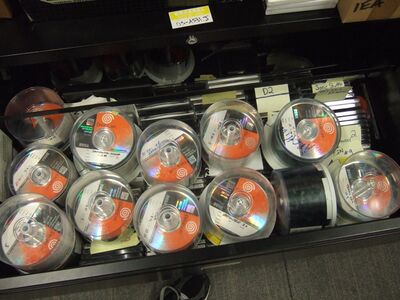GD-ROM: Difference between revisions
Jump to navigation
Jump to search
No edit summary |
No edit summary |
||
| Line 2: | Line 2: | ||
Holds a [[0GDTEX.PVR]] image that can be shown on the Bios CD player screen. | Holds a [[0GDTEX.PVR]] image that can be shown on the Bios CD player screen. | ||
The most common GD-ROM image format is the [[GDI format]]. | |||
==GD-R discs== | ==GD-R discs== | ||
[[File:GDR discs at Sega.jpg|400px|thumb|right|GD-R discs stored at Sega of America]] | [[File:GDR discs at Sega.jpg|400px|thumb|right|GD-R discs stored at Sega of America]] | ||
GD-R discs are the recordable version of Sega's proprietary disc format. GD-Rs lack the security ring between the standard density and high density sections, and thus only boot on a retail Dreamcast system using a [[System Disc 2]]. The [[Katana Dev.box]] will also play these discs. | GD-R discs are the recordable version of Sega's proprietary disc format. GD-Rs lack the security ring between the standard density and high density sections, and thus only boot on a retail Dreamcast system using a [[System Disc 2]]. The [[Katana Dev.box]] will also play these discs. | ||
Revision as of 21:15, 5 January 2023
The GD-ROM format is Sega's proprietary disc format used for the Sega Dreamcast home console, as well as for the arcade systems NAOMI, NAOMI 2, Triforce, and Chihiro.
Holds a 0GDTEX.PVR image that can be shown on the Bios CD player screen.
The most common GD-ROM image format is the GDI format.
GD-R discs
GD-R discs are the recordable version of Sega's proprietary disc format. GD-Rs lack the security ring between the standard density and high density sections, and thus only boot on a retail Dreamcast system using a System Disc 2. The Katana Dev.box will also play these discs.
